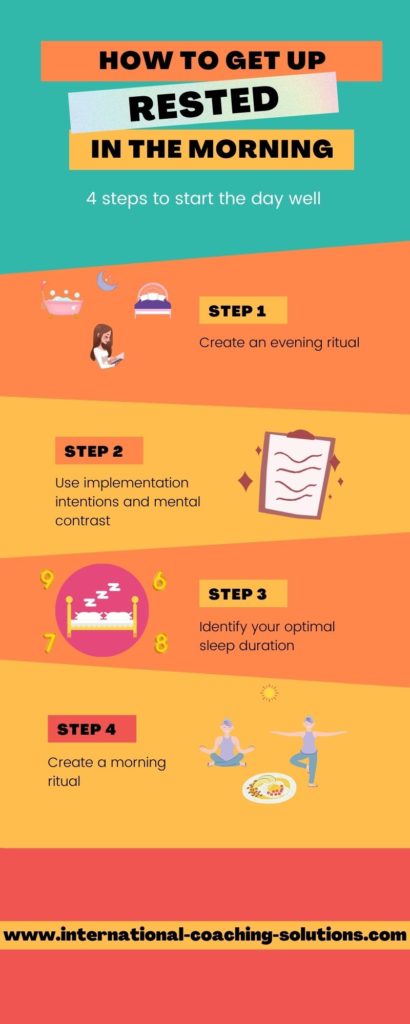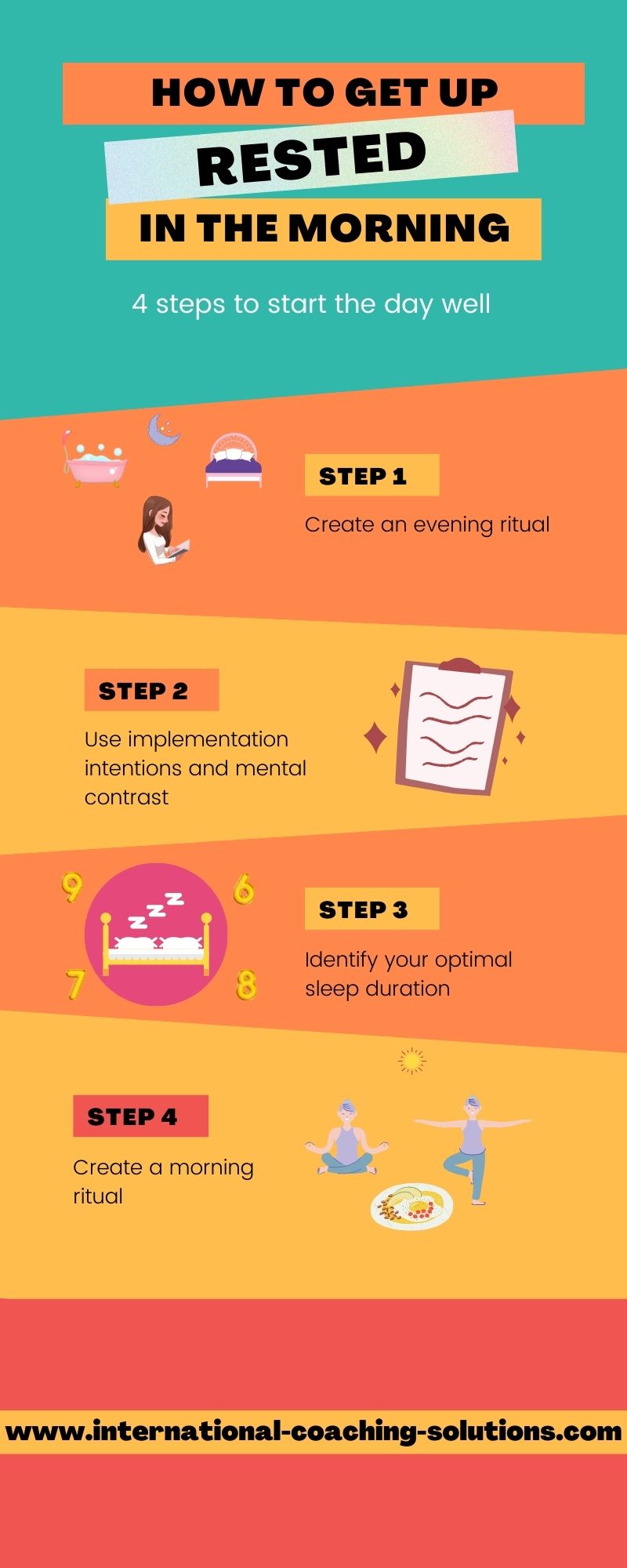
In this article, you will discover 4 tips on how not to wake up tired in the morning so that you feel good and are ready to make productive use of your day.
If you need to set several alarm clocks in the morning to be able to get out of bed, the tips in this article will allow you to wake up full of energy to enjoy your day.
Without further ado, discover my 4 tips on how to not struggle to wake up and not feel tired in the morning.
4 steps to getting up fast and effortlessly in the morning
1 – Create an evening ritual
The first tip is to create and follow an evening ritual.
The quality and quantity of your sleep are critical to your well-being and productivity.
A simple and effective way to recover both your physical and mental energy is to lay the foundation for restorative sleep by creating a ritual.
You need to create a habit with simple steps to follow to facilitate falling asleep.
For example, you can read a personal development book that relaxes and captivates you every night before bed.
This ritual can also be more complex.
The key is to create one that helps you reduce stress and sets the stage for a good night’s sleep.
If you are feeling stressed because of your work or family life, I recommend reading the article how to relax fast in which you will find 7 tips to reduce your stress.
Creating an evening ritual is also a great way to prevent sleep procrastination.
This is the tendency to put off going to sleep for no real reason.
To go deeper into the topic of sleep, I recommend reading this article on how to sleep better.
Now it’s time to move on to the next tip which is to use tools like implementation intentions and mental contrast.
2 – Use implementation intentions and mental contrast
If you followed the previous advice, you have now established a ritual or habit to create the ideal conditions for faster and more efficient sleep.
But life is full of unexpected events, some of which are beyond our control.
For this reason, establishing a habit is not enough.
To turn your decision into a habit, you need to repeat the behavior for several days and even weeks.
To achieve this, you can use implementation intentions and mental contrast.
These are two cognitive-behavioral tools that will help you maintain your new habit.
Implementation intentions are if-then statements that will facilitate the execution of a given behavior.
In your case, the implementation intention might be “If it’s 11 pm then I’ll read my favorite book”.
The mental contrast consists of the following:
- listing all the things that might prevent you from implementing a given behavior
- finding one or more solutions to these obstacles in advance
For example, you identify what might be standing in the way of your decision:
- yourself
- an interesting movie
- a family member
- a work task to complete
If you are the cause of your difficulty getting up in the morning, you can, for example, think about the last time you didn’t get enough sleep and how that negatively impacted your day.
The key is to prepare in advance at least one behavioral option that will help you stick to your evening habit as much as possible.
At this point, I suggest you move on to the next tip, which is to identify your optimal bedtime duration.
3 – Identify your optimal sleep duration
We are all different when it comes to the number of hours needed to fully recover from fatigue.
Most people need at least 6-7 hours of sleep each night, but others need 8-9 hours.
Try experimenting with several nights of sleep ranging in length from 6 to 9 hours to figure out what your ideal sleep time is.
Most people who have difficulty getting up in the morning get less sleep than they need.
To make this advice easier to incorporate into your life, you can keep track of:
- how many hours do you sleep
- how do you feel in the morning when you wake up
- how you feel around 2:00 p.m., 6:00 p.m., and 10:00 p.m.
Keeping a written record of your actions will help you understand what your true needs are.
If you sleep less than 6 hours a night, you need to figure out what keeps you from bed earlier.
In some cases, it may be stress, anxiety, or poor choices in terms of pre-sleep strategies.
If you can’t identify the reasons for your behavior, you can benefit from the expertise of a life coach who will help you put in place habits that are more suitable for your well-being.
Now I suggest that we move on to the next tip, which is to create a morning ritual.
4 – Create a morning ritual
If the evening ritual aims to create the ideal conditions for a satisfying night’s rest, the morning ritual allows you to wake up more easily and start your day in the best way possible.
You can adapt the duration of this new habit to your personal situation.
Ideally, this ritual should include 3 types of awakening:
- physical
- mental
- nutritional
To make this ritual easier to carry out, it is important to define it before you go to sleep.
Here are some simple questions you can answer to make it easier.
What type of exercise best prepares me to enjoy the day?
What type of activity (reading, meditation, etc.) contributes most to my motivation and well-being?
What type of breakfast gives me the most energy in the morning?
I recommend varying your ritual by adapting it to your changing personal or professional needs.
You should also set a time limit for this ritual so that you can effectively plan it into your schedule.
The longer you devote to your morning ritual, the easier it will be for you to integrate it into your life and plan your day better.
Bonus tip: Think about your health
Getting enough sleep is important for your physical and mental health.
Here are some of the findings of scientific studies concerning physical health.
For example, as Knutson & al. (2009) show, reduced sleep time increases blood pressure.
And Beccuti & Pannain (2013) show that reduced sleep increases the risk of obesity.
Here’s what the studies say about mental health.
O’Leary & al. (2016) show that people who don’t get enough sleep find it harder to regulate their emotions, and this increases their risk of suffering from depression.
Chellappa & Aeschbach (2022) show that people who don’t get enough sleep are more likely to suffer from anxiety.
Finally, Scott & al. (2021) show that improving sleep not only improves anxiety and depression but also reduces mental rumination.
In short, by improving the quantity and quality of your sleep, you’ll be able to enjoy better health and wake up in the morning in better condition.
Conclusion on how to wake up rested in the morning
In this article, you learned four useful steps that will help you improve the quality of your sleep and have more energy to make your day more productive.
Here is an infographic that summarizes these tips.

If you are interested in the topic of productivity, I invite you to discover all my articles on productivity.
If you are looking for tools to improve your time management skills, I recommend you read my article on the best time management apps.
If you want to learn how to manage your time, I invite you to find out more about our online time management course.
If you would like to take advantage of the expertise of a time management coach, write to us now using our contact form, call us at +33 6 69 46 03 79, or contact us on WhatsApp at +33 6 69 46 03 79.
If you are ready to take action, check out our life coaching packages:
- one month life coaching package
- 3-month life coaching package
- 6-month life coaching package
- 1-year life coaching package
Read this article in other languages
Français : 4 étapes pour bien se lever le matin rapidement et sans effort
Italiano: Come non fare fatica a svegliarsi e non sentirsi stanchi al mattino

